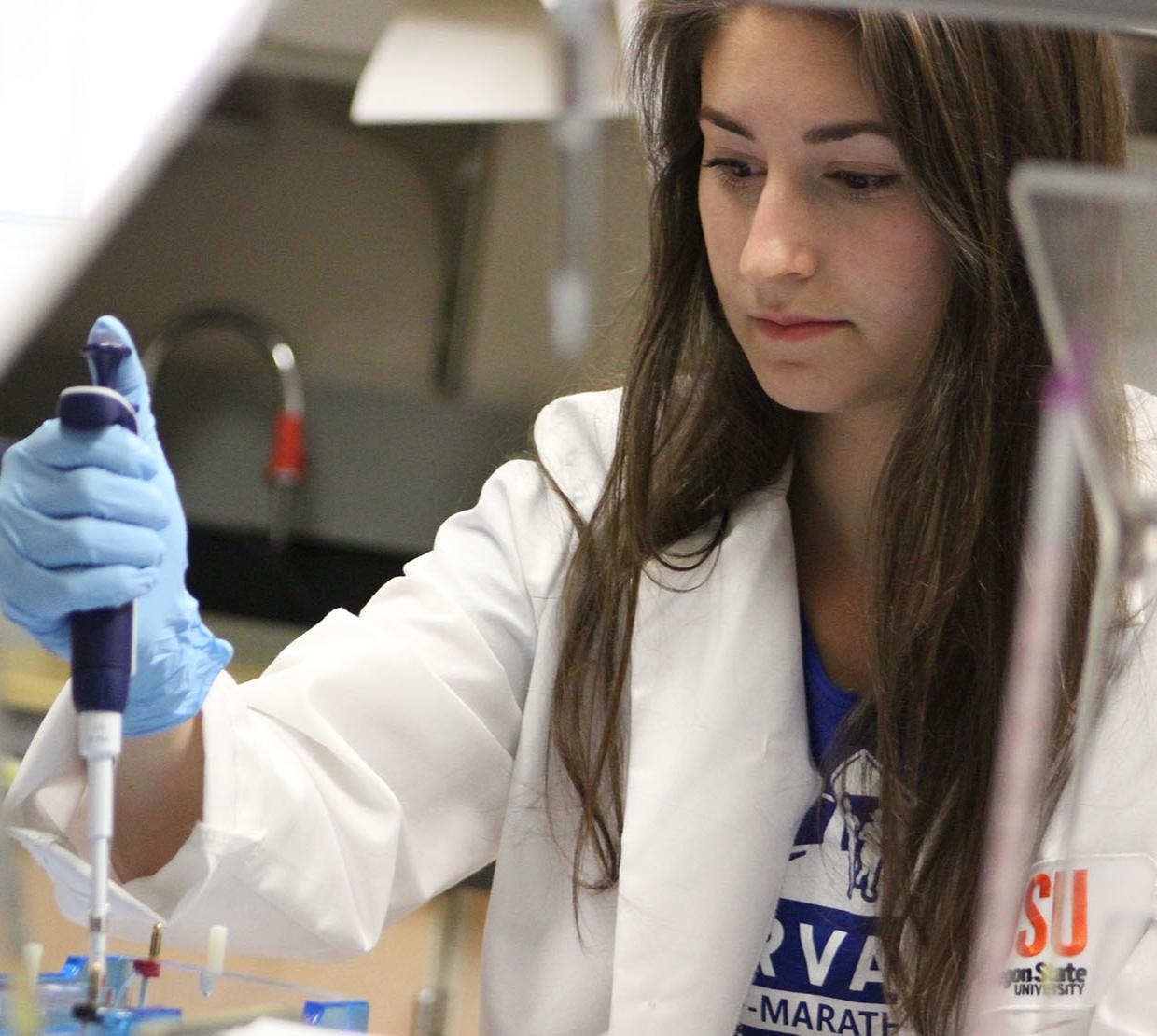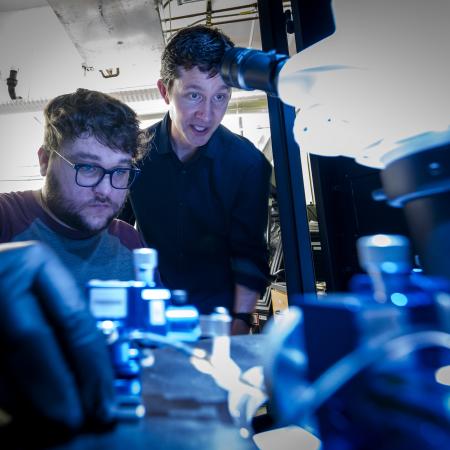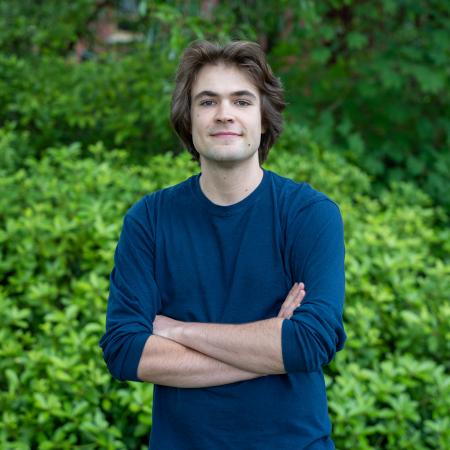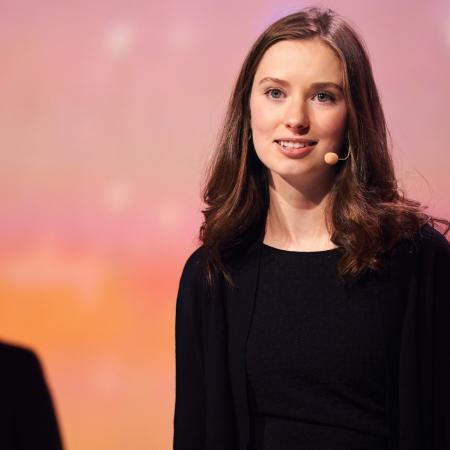In the College of Science, students have more opportunities to collaborate on undergraduate research that addresses real-world problems and prepares them for top graduate programs and training at internationally recognized institutions.
Half of undergraduate students in the College of Science not only work on research projects with faculty mentors across the campus, but also find a home at Oregon State University’s cutting-edge scientific centers and institutes.
Oregon State funds more high-impact undergraduate research experiences than any other university in the state. Undergraduate research programs give students hands-on learning experiences early in their undergraduate careers, opportunities to learn new things and develop new skill sets beyond the scope of the classroom.
Undergraduate research enhances employment opportunities
Undergraduate research opportunities also play a key role in developing student-faculty relationships. Associate Professor of Physics Matthew Graham mentors several undergraduate students supported by research fellowships in his lab and has found that the value of undergraduate research on student careers cannot be overestimated. “Research is an unspoken, firm prerequisite for graduate school, and it is one of the few ways industry-bound graduates can stand-out in getting their first job. I am surprised at how often potential employers contact me for references.”
Substantive undergraduate research experiences are the norm rather than the exception in the College of Science. A key trait that sets the College’s undergraduate research program apart is that students get the financial support they need to commit to a research program long enough to make effective contributions to scientific discovery and new foundational knowledge.
“The big reason that I came to OSU – and why I really love it – is because of the research opportunities."
“Science requires time, and while as mentors we strive to offer meaningful research opportunities to undergraduate students throughout the year, having the secured time-commitment to follow experimental designs from start to end and really own the research project they are developing is empowering for the students,” said Maria Franco, an associate professor of biochemistry who mentors undergraduate research scholars in her lab. “This is a very valuable opportunity that can impact their professional and personal goals in meaningful ways.”
Capping off more than three years of research in a disordered proteins lab, Seth Pinckney (Biochemistry & Biophysics '21) co-authored two manuscripts, one of which shares early results on the SARS-CoV-2 nucleocapsid protein.
Linus Unitan (Honors Chemistry '21) and his mentor Professor of Chemistry Vince Remcho were awarded a patent for devising a blood-plasma separator device for medical purposes in an analytical chemistry lab. Unitan also co-authored a paper on the subject in the journal Analytical and Bioanalytical Chemistry.
The high caliber of undergraduate research is verified by the success of OSU science majors who have won some of the most competitive national awards, including the Goldwater and Fulbright awards, as well as the National Science Foundation Graduate Research fellowship. Since 2017, all Goldwater scholars from the College, eight in total, were involved in extensive undergraduate research programs before winning the national prestigious award.
“The big reason that I came to OSU – and why I really love it – is because of the research opportunities,” said biochemistry alumna Kendra Jackson (Honors Biochemistry and Molecular Biology '20), who received both Ray and Frances Cripps Undergraduate Research Experience (CURE) and Summer Undergraduate Research Experience (SURE) fellowships to conduct research on fungal genetics and epigenetics. Jackson won the Goldwater scholarship in 2019 and is currently studying medicine at Stanford University.
SURE scholarships fuel student success
Students work independently to tackle aspects of research projects that are at the cutting-edge of scientific innovation, preparing them well for careers in science and industry. Chemistry student and SURE scholar Alice Lulich ('23) is doing research in a lab specializing in new inorganic materials. “The structures I make in the lab have never been made before,” Lulich said. “The SURE scholarship means that I will get to have as close to a grad school experience as possible in my undergraduate career.”
Undergraduate research programs also help students discover new interests and passions, enabling them to venture bravely outside their comfort zones. Zoology major Dustin Campbell ('20) won the SURE scholarship to conduct research in the area of reproductive behaviors in garter snakes.
Doing so helped Campbell discover a talent for both field and lab-based zoological research. “I thoroughly enjoy collecting animal specimens and field research. The SURE program showed me what the work looks like in the lab after you have collected the specimens. Being in the lab helped me realize that I do really like all aspects of animal research.”
Supported by donors, alumni and faculty, funded undergraduate research opportunities have had a positive and powerful effect on student learning and achievement. Since its inception in 2015, the Summer Undergraduate Research Experience (SURE) Program has helped science faculty engage undergraduates in their research. Supported by our extraordinary alumni and donors, in the last two years, SURE Science, among other student scholarship programs, provided $405K in scholarships to 80 students to participate in substantive lab and field-based research experiences.
“The structures I make in the lab have never been made before."
Our alumni are passionate about paving the way for students on their journeys to meaningful careers. Joel Peterson (Microbiology ’69) says he gives so that students can “get a better understanding early on of where research in their field is headed,” adding that students’ “enthusiasm and idealism” make him “feel like I’m doing something worthwhile.”
In addition to the SURE Science program, more than 10 different alumni-funded scholarships – both College-wide and department-specific support undergraduate research. These include the Student Research Experience Fund, the Ray and Frances Cripps Undergraduate Research Experience (CURE) fellowship in the Department of Biochemistry and Biophysics, the Sheila Van Zandt Student Research Experience Fund; the College of Science Experiential Learning Fund; and numerous other department-specific awards. Each year these fellowships support students as they engage in original research alongside faculty mentors working on projects that span countless areas of fundamental and applied sciences and mathematics.
The alumni behind these funds, grateful for their own formative years in the College, believe that passing the baton enhances graduate prospects and creates a more hopeful future. “These young people are going to change the world,” said alumna and scholarship donor Judy Faucett (Mathematics ’70). “They are doing incredibly important things.”
OSU research means enhanced access and equity
The SURE Science program and other scholarships have widened equity and access to careers in science, increasing opportunities for underrepresented minority students and first-generation and low-income students.
"I am finally able to start doing the kind of research I want to do for the rest of my life!"
Instead of worrying about finances, mathematics student Luis Garcia-Lamas ('22) spent last summer conducting full-time paid research on corn genetics, using statistical modeling and data analysis to predict phenotype outcomes. “I come from a low-income background, so scholarships mean a lot to me. This research is fundamental to my upcoming graduate school applications,” said Garcia-Lamas.
With the help of funding, science students overcome significant barriers to engage in valuable research opportunities. “This scholarship means the world to me,” said integrative biology major Samantha Gregory, who studies the impacts of a predatory snail on ecosystems in the intertidal zone at Patrick’s Point, California. “I have several chronic illnesses and accessing scholarship programs where I can control my physical activity has been a challenge. I am finally able to start doing the kind of research I want to do for the rest of my life!”
True to its mission as a land grant research university, the College research programs are helping build the next generation of scientists and leaders so that they can develop innovative solutions to the challenges facing our world.




